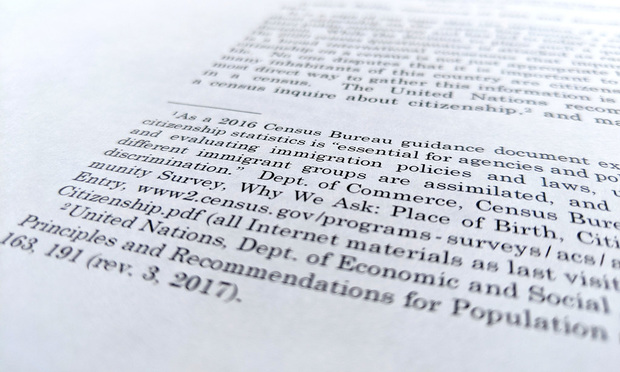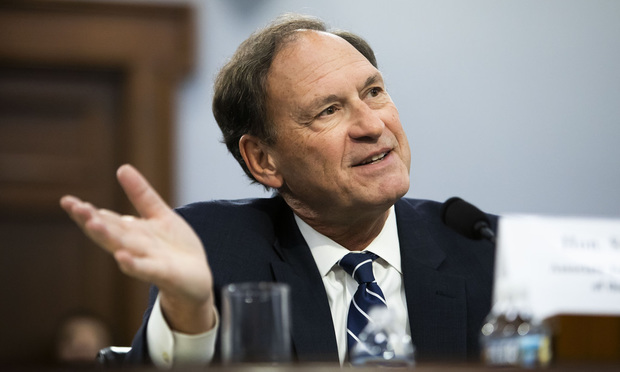Trump in Claiming Census Victory Nods to Alito's Dissent
A comparison of Trump's executive order and the Supreme Court's decision blocking the administration from adding a citizenship question revealed a similarity.
July 12, 2019 at 03:01 PM
5 minute read
The original version of this story was published on National Law Journal
 Justice Samuel Alito's footnote in his census case dissent made an appearance in the Trump administration's executive order announced Thursday.
Justice Samuel Alito's footnote in his census case dissent made an appearance in the Trump administration's executive order announced Thursday.
The Trump administration's executive order addressing the collection of citizenship data doesn't mention Justice Samuel Alito's dissent in the recent U.S. Supreme Court census case. But one of his footnotes may have provided some inspiration as officials looked for reasons justifying the gathering of that information.
A comparison of Trump's executive order, and the Supreme Court's decision blocking the administration from adding a citizenship question, revealed one primary similarity: Alito's first footnote.
Alito was on the losing side of the Supreme Court's census ruling, and he wrote a dissent that argued federal judges should not play any role in reviewing the U.S. Commerce Department's reasoning for including a citizenship question on the census. “No one disputes that it is important to know how many inhabitants of this country are citizens,” Alito wrote in his opening lines, to which he attached a footnote.
That footnote said: “As a 2016 Census Bureau guidance document explained, obtaining citizenship statistics is 'essential for agencies and policy makers setting and evaluating immigration policies and laws, understanding how different immigrant groups are assimilated, and monitoring against discrimination.'”
Trump's executive order, which said agencies must collaborate to provide records showing citizenship status information, identified four reasons why the government wants to ensure “that the department has available the best data on citizenship that administrative records can provide.”
The first reason pointed to the Census Bureau guidance that Alito quoted in his footnote. Trump's executive order stated: “The Census Bureau has long maintained that citizenship data is one of the statistics that is 'essential for agencies and policy makers setting and evaluating immigration policies and laws.'”
The document that Alito noted in his footnote was not referring to the census itself, but to a different survey tool employed by census officials. When the Justice Department asked the Supreme Court to take up the citizenship question case, after losing a trial court ruling in New York, the petition did not identify the survey that Alito noted.
Alito's footnote caught the attention of several legal scholars, including Marty Lederman, an Obama-era Justice Department lawyer who now teaches at Georgetown University Law Center. Lederman predicted on Twitter recently that the Trump administration might try to use Alito's footnote as part of any new effort to argue in support of adding a citizenship question after the Supreme Court's ruling last month.
Although he didn't think Trump's reasons in the executive order should have prevailed if they had been offered in the census litigation, Lederman tweeted on Thursday: “But they would have had a much better shot going with them—and in hindsight almost certainly would have prevailed.”
Instead, the Commerce Department argued throughout the federal court litigation that the citizenship question was necessary for enforcement of the Voting Rights Act. The Supreme Court majority called those justifications “contrived.”
“We cannot ignore the disconnect between the decision made and the explanation given,” Chief Justice John Roberts Jr. wrote for the majority, joined by the court's liberal members.
 Justice Samuel Alito testifying before Congress earlier this year. Credit: Diego M. Radzinschi / ALM
Justice Samuel Alito testifying before Congress earlier this year. Credit: Diego M. Radzinschi / ALMAlito didn't think the Supreme Court had any business questioning what Commerce Secretary Wilbur Ross said—or did not say—were his real motivations for asking census respondents to say whether they are living in the country as a citizen. In his 20-page dissent, Alito called the majority decision “regrettable.”
“To put the point bluntly, the federal judiciary has no authority to stick its nose into the question whether it is good policy to include a citizenship question on the census or whether the reasons given by Secretary Ross for that decision were his only reasons or his real reasons,” Alito wrote.
Trump, appearing with U.S. Attorney General William Barr on Thursday in the Rose Garden, announced the administration would give up its effort to put a citizenship question on the census. Lawyers involved in the litigation, including Dale Ho, who leads the voting rights team at the American Civil Liberties Union, declared victory. “It's official. There will be NO citizenship question on the 2020 census. It's over. We won,” Ho said in a tweet.
The census executive order the Trump administration issued Thursday wasn't the first to cite a Supreme Court justice.
In 2017, just weeks after taking office, Trump signed an environmental-law order that included a direct reference to the late Justice Antonin Scalia. The order, limiting the scope of what environmental regulators would consider the “waters of the United States,” directed the U.S. Environmental Protection Agency to revise the federal waters rule “in a manner consistent with the opinion of Justice Antonin Scalia” in the case Rapanos v. United States.
Scalia wrote the 2006 plurality opinion for the high court. Alito's dissent in the census case was joined by no other justice.
Read more:
Most Memorable Footnote? Here's What a Few Lawyers Told Us.
'Regrettable.' 'First Time Ever.' 'Inventing.' How Justices Fumed Over Census Ruling
Roberts, Ruling Against Trump, Faces New Round of Conservatives' Criticism
Two More Federal Judges Question DOJ's Census Case Maneuvering
Here's the DOJ Team Leading Trump's 11th Hour Census Litigation
This content has been archived. It is available through our partners, LexisNexis® and Bloomberg Law.
To view this content, please continue to their sites.
Not a Lexis Subscriber?
Subscribe Now
Not a Bloomberg Law Subscriber?
Subscribe Now
NOT FOR REPRINT
© 2025 ALM Global, LLC, All Rights Reserved. Request academic re-use from www.copyright.com. All other uses, submit a request to [email protected]. For more information visit Asset & Logo Licensing.
You Might Like
View All
'Should I Sue?': Navigating the New APA Landscape With Latham's Phil Perry and Andrew Prins

Litigator of the Week: Akin's Pratik Shah Helps the Chamber Block the NLRB's 'Joint Employer' Rule

Litigators of the Week: Hogan Lovells Duo Protects a 'Speed Bump' for High-Frequency Traders
Trending Stories
- 1Perkins Coie Lures Former Longtime Wilson Sonsini Tech Transactions Partner
- 2‘The Decision Will Help Others’: NJ Supreme Court Reverses Appellate Div. in OPRA Claim Over Body-Worn Camera Footage
- 3MoFo Associate Sees a Familiar Face During Her First Appellate Argument: Justice Breyer
- 4Antitrust in Trump 2.0: Expect Gap Filling from State Attorneys General
- 5People in the News—Jan. 22, 2025—Knox McLaughlin, Saxton & Stump
Who Got The Work
J. Brugh Lower of Gibbons has entered an appearance for industrial equipment supplier Devco Corporation in a pending trademark infringement lawsuit. The suit, accusing the defendant of selling knock-off Graco products, was filed Dec. 18 in New Jersey District Court by Rivkin Radler on behalf of Graco Inc. and Graco Minnesota. The case, assigned to U.S. District Judge Zahid N. Quraishi, is 3:24-cv-11294, Graco Inc. et al v. Devco Corporation.
Who Got The Work
Rebecca Maller-Stein and Kent A. Yalowitz of Arnold & Porter Kaye Scholer have entered their appearances for Hanaco Venture Capital and its executives, Lior Prosor and David Frankel, in a pending securities lawsuit. The action, filed on Dec. 24 in New York Southern District Court by Zell, Aron & Co. on behalf of Goldeneye Advisors, accuses the defendants of negligently and fraudulently managing the plaintiff's $1 million investment. The case, assigned to U.S. District Judge Vernon S. Broderick, is 1:24-cv-09918, Goldeneye Advisors, LLC v. Hanaco Venture Capital, Ltd. et al.
Who Got The Work
Attorneys from A&O Shearman has stepped in as defense counsel for Toronto-Dominion Bank and other defendants in a pending securities class action. The suit, filed Dec. 11 in New York Southern District Court by Bleichmar Fonti & Auld, accuses the defendants of concealing the bank's 'pervasive' deficiencies in regards to its compliance with the Bank Secrecy Act and the quality of its anti-money laundering controls. The case, assigned to U.S. District Judge Arun Subramanian, is 1:24-cv-09445, Gonzalez v. The Toronto-Dominion Bank et al.
Who Got The Work
Crown Castle International, a Pennsylvania company providing shared communications infrastructure, has turned to Luke D. Wolf of Gordon Rees Scully Mansukhani to fend off a pending breach-of-contract lawsuit. The court action, filed Nov. 25 in Michigan Eastern District Court by Hooper Hathaway PC on behalf of The Town Residences LLC, accuses Crown Castle of failing to transfer approximately $30,000 in utility payments from T-Mobile in breach of a roof-top lease and assignment agreement. The case, assigned to U.S. District Judge Susan K. Declercq, is 2:24-cv-13131, The Town Residences LLC v. T-Mobile US, Inc. et al.
Who Got The Work
Wilfred P. Coronato and Daniel M. Schwartz of McCarter & English have stepped in as defense counsel to Electrolux Home Products Inc. in a pending product liability lawsuit. The court action, filed Nov. 26 in New York Eastern District Court by Poulos Lopiccolo PC and Nagel Rice LLP on behalf of David Stern, alleges that the defendant's refrigerators’ drawers and shelving repeatedly break and fall apart within months after purchase. The case, assigned to U.S. District Judge Joan M. Azrack, is 2:24-cv-08204, Stern v. Electrolux Home Products, Inc.
Featured Firms
Law Offices of Gary Martin Hays & Associates, P.C.
(470) 294-1674
Law Offices of Mark E. Salomone
(857) 444-6468
Smith & Hassler
(713) 739-1250







